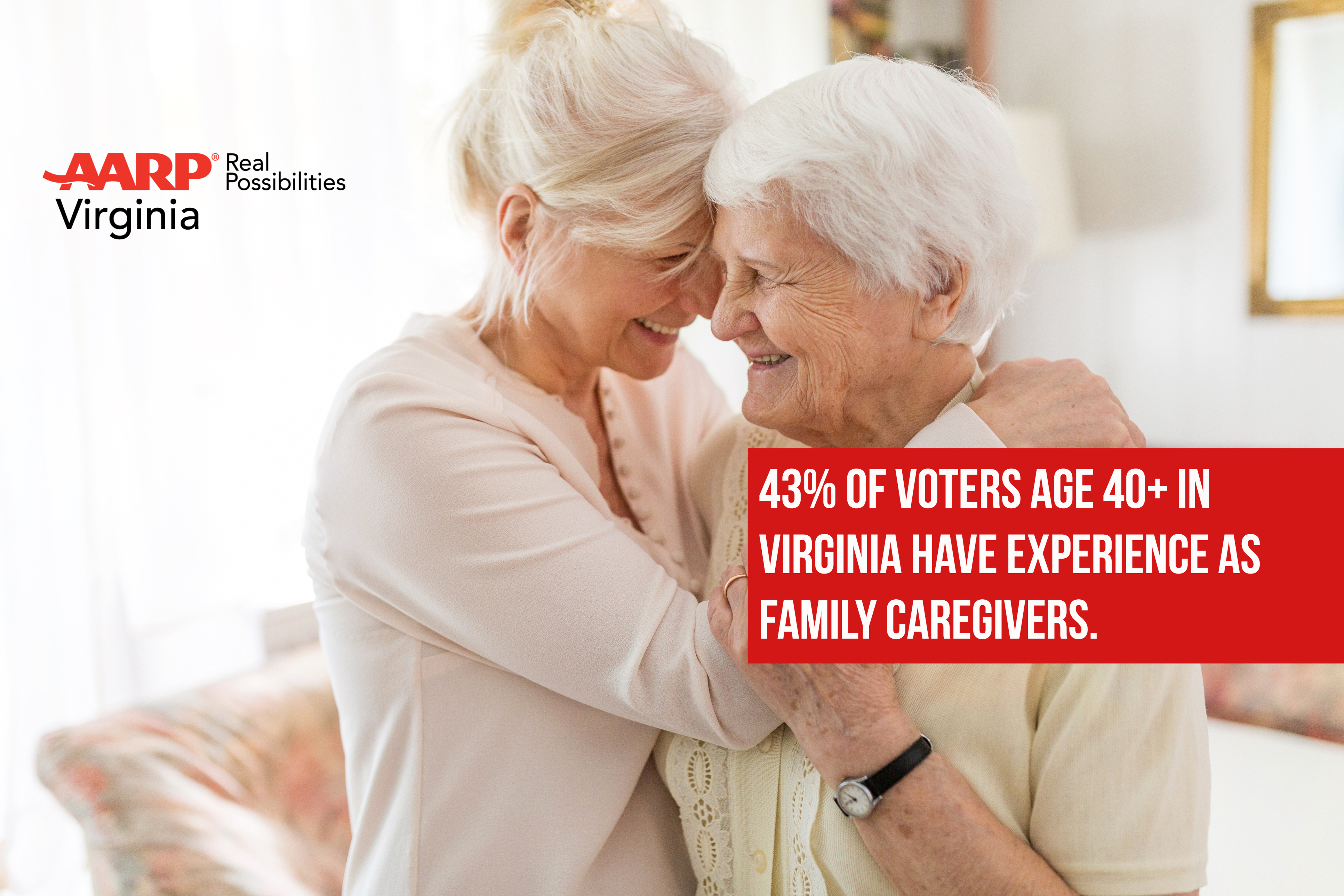AARP Hearing Center

A new survey of Virginia voters ages 40-plus paints a portrait of the difficult challenges facing unpaid family caregivers, and sends a clear message to state candidates about what they want.
“People across Virginia face critical, mounting strains that come with being unpaid caregivers for their loved ones,” said Jim Dau, AARP Virginia State Director. “Candidates for office would do well to tell voters how they plan to help them with this real-life, every day challenge.”
Caregiving in Virginia
More than 1 million Virginians serve as family caregivers, helping with regular activities like driving to medical appointments and shopping, as well as more advanced responsibilities like managing finances and performing medical tasks. In 2013, these caregivers provided $11.7 billion in uncompensated care.
The new AARP survey found that more than four-in-ten (43%) of all voters ages 40-plus in Virginia have experienced being unpaid family caregivers, including 13% who are currently providing care. Nearly two-in-three (64%) of current and former caregivers have worked while they provided care to loved ones and about as many (63%) have spent their own money doing so.
Other key findings include:
- Three-in-ten (30%) caregivers have dipped into their retirement savings to support their loved ones, and more than a quarter (27%) have had problems paying for their everyday necessities for themselves and their families.
- Almost seven-in-ten (69%) feel emotionally stressed; 33% have experienced problems with their health due to their caregiving responsibilities; and 26% had problems making time to see their own doctors.
- A little more than half (53%), say their loved ones would have to move to institutional care settings if they were no longer able to serve as caregivers.
“These caregivers risk their own financial security and physical health, while also saving taxpayers billions of dollars per year,” added Dau. “They are on missions of love, but unless they get help, something’s got to give.”
What voters want
Even in an increasingly divisive political environment, a near consensus of all voters ages 40-plus - regardless of their party affiliation or whether they have provided care or not - agree that family caregivers should get more help and agree on several measures that could provide it.
Nearly nine-in-ten Virginia voters ages 40-plus support giving caregivers some form of flexibility at their jobs, including allowing them to use sick leave for caregiving (88%); making sure they can’t get fired for caregiving (85%); or requiring employers to provide some unpaid (82%) or paid (77%) leave. A similar number (85%) support providing caregivers with short-term help by a home health aide so they can take a break.
Other key findings include:
- 82% of all Virginia voters ages 40-plus say they vote in state elections at least most of the time, including 58% who say they always vote.
- These voters report a roughly even partisan split among Democrats (28%), Republicans (25%), and Independents (25%).
“While this survey focuses on voters 40-plus, there are approximately 250,000 millennial caregivers in Virginia facing similar strains,” added Dau. “To any candidate running for the General Assembly, the message is clear: voters of all political stripes, backgrounds, and ages want help for struggling caregivers.”
Family Caregiver Tax Credit
AARP Virginia is working to enact one solution that would help—a family caregiver tax credit. Caregivers who live close to their loved ones spend an average of more than $7,000 per year - a number that jumps to $11,000 for those who live at least an hour away - of their own funds to provide care. The tax credit would allow eligible caregivers to deduct certain caregiving expenses from their state income tax bill, up to $1,000.
The new survey found that Virginia voters 40-plus are nearly unanimous (88%) in their support for a family caregiver income tax credit. This support cuts across party lines among Democrats (94%), Republicans (87%, and Independents (89%).
Underscoring the opportunity for this year’s candidates for the General Assembly, 80% of all voters 40-plus say they would support a candidate who worked to pass the family caregiver tax credit. Again, this support cuts across party lines, including high levels of support from Democrats (89%), Republicans (77%), and Independents (82%).
“Candidates have a great opportunity to earn votes by telling their constituents their plans to help family caregivers,” said Dau. “They also run a risk if they don’t.”
Between now and Election Day, AARP Virginia and its volunteers will work to make sure candidates are discussing issues important to voters of all ages, and helping voters get the information they need to make their own choices at the polls. Voters can visit the AARP Virginia website for contact information for candidates to ask them where they stand on issues. See the full voter survey here.
AARP does not endorse candidates or parties, or make political donations to candidates or political action committees. With more than 1 million members in Virginia, AARP is the largest organization working on behalf of people age 50+ and their families in the Commonwealth.
To learn more about AARP Virginia, like us on Facebook at www.facebook.com/aarpvirginia and follow @AARPVa on Twitter at www.twitter.com/aarpva.
AARP is the nation’s largest nonprofit, nonpartisan organization dedicated to empowering people 50 and older to choose how they live as they age. With a nationwide presence and nearly 38 million members, AARP strengthens communities and advocates for what matters most to families: health security, financial stability and personal fulfillment. AARP also produces the nation's largest circulation publications: AARP The Magazine and AARP Bulletin. To learn more, visit www.aarp.org or follow @AARP and @AARPadvocates on social media.































































